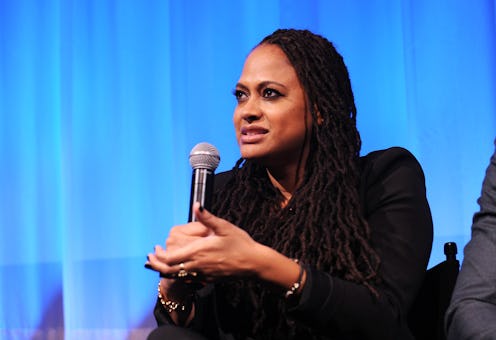Entertainment
Marvel Needs More Than Ava DuVernay
Ava DuVernay really only started getting the credit she really deserves in 2014, when Selma stole the hearts and consciousness of film audiences around the world, earning her critical acclaim and even a Best Picture nomination at the Academy Awards. However, DuVernay has been working hard in Hollywood for decades, first as a publicist and later as a screenwriter, producer and director, which she happens to be pretty good at. It's no surprise, therefore, that Marvel wants DuVernay to direct a "diverse" superhero movie within its franchise — potentially Black Panther, due in 2018. It's a fantastic and natural choice based on DuVernay's talents alone, but is it really enough?
It wasn't long ago when DuVernay expressed interest in Marvel's big screen adaptations, saying that she'd love to "deconstruct heroes, deconstruct myths" and admitting that she'd likely opt for an origin story which explored how some of the big heroes we know now got to where they are. Her perspectives on the franchise, which has been plagued by diversity problems since its inception if we're going to be honest, is refreshing and would no doubt elevate Marvel to a higher level in terms of appeal, relatability and creativity. However, it doesn't really get to the heart of the problem and is just the tip of the iceberg when it comes to fixing Marvel's serious issues.
DuVernay is a wonderfully capable and prolific writer, producer and director, but those talents exist outside of her status as a woman, and, more particularly, as a woman of color. Is Marvel courting her because of criticism surrounding the lack of women and people of color in their film crews and on screen? Hopefully that's unfounded cynicism. Bustle reached out to Marvel for comment, but have yet to hear back from them.
After all, DuVernay's involvement with Marvel, should it actually be written in stone, should be seen as the beginning steps, not a complete and total solution to a more widespread problem. Yes, we need more women involved in Marvel movies, and we need more representation for people of color. We also need heroes with disabilities, heroes that aren't heterosexual, and the list goes on and on. But hiring one person that ticks a few boxes to make Marvel's franchise seem as though suddenly it's representing all people is not only reductive, it's missing the point.
DuVernay's experience as a black female will likely inform her interpretations of Marvel's superheroes and their stories, but it's a catalyst for more improvements in the area of diversity, not a be-all, end-all one step fix for the myriad issues they still need to confront. In all honesty, inclusion of minorities and disenfranchised groups within the Marvel universe shouldn't even be seen as an accomplishment, anyway — it should be seen as the natural thing to do considering it mirrors the real world we all live in on a daily basis. It's vibrant, colorful and full of differences, and it's what makes life interesting. Isn't that enough of a goal to strive for, really?
Of course, we have a long way to go in the world in general, as well as in entertainment, when it comes to inclusivity of all people, and Marvel is not alone in creating blockbusters that mostly cater to white heterosexual males. And while you don't have to be a white heterosexual male in order to enjoy Marvel superhero films — I've seen and enjoyed several myself — it would also be nice to go to a movie and see something on screen I could actually relate to. A hero who is like me, like a real person rather than just a busty caricature that men can jokingly refer to as a "slut" rather than take seriously.
Until then, I'll be grateful if DuVernay is brought into the Marvel world, because at the end of the day, it's certainly a step in the right direction. A small step, but a step nonetheless, and sometimes, you've got to take any progress you can get.
Images: Getty Images (1); Giphy (1)
